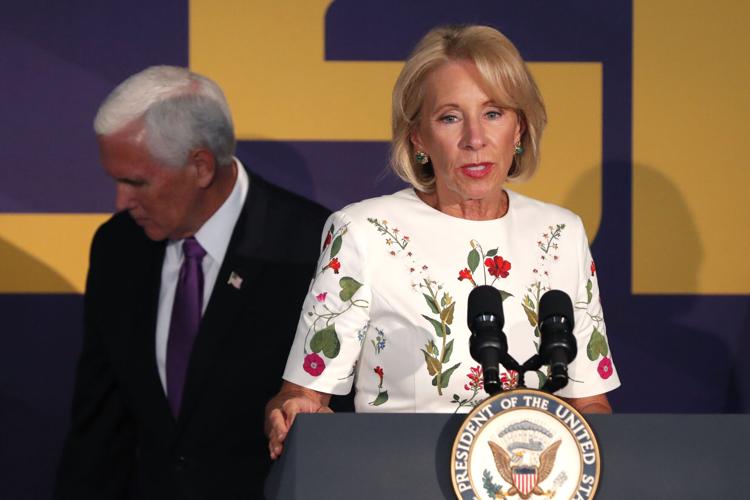DeVos: Children need to get back into school routines

U.S. Education Secretary Betsy DeVos speaks at a news conference Tuesday, July 14, 2020, with Vice President Mike Pence in Tiger Stadium, on the Louisiana State University campus in Baton Rouge, La.
(The Center Square) – U.S. Education Secretary Betsy DeVos said Wednesday that K-12 students need to return to their routines of in-classroom learning, with schools having the ability to adapt quickly to a spike in COVID-19 cases.
DeVos told viewers of a Georgia Public Policy Foundation virtual forum that returning to normal is essential to the well-being and development of children.
“It is really a matter of health versus health,” DeVos said as the keynote speaker in Wednesday’s forum. “We know that there are too many kids today who are suffering because of the isolation and the distance from their peers and their teachers, and having missed several months of learning in some cases – in many cases.”
Georgia school districts have the flexibility to customize their learning models for the upcoming school year. With many of them reopening next month and as early as the first week in August, school districts have started to release their plans to the public.
Atlanta and DeKalb County school districts will be offering only virtual classes to students when the semester starts in mid- and late August. Still, officials said they will be following the severity of the coronavirus outbreak.
Parents in Hall, Buford, Cherokee, Cobb, Coweta, Henry, Marietta, Fayette, Forsyth, Fulton and Gwinnett counties can choose between in-person instruction in classrooms or distance learning for their children.
Guidance by the Georgia Department of Education provides school districts with instructions on how to respond and prevent outbreaks on campuses.
DeVos said parents and educators should use what they learned from school closures in the spring to prepare children for the fall semester.
School districts that responded well and resumed classes quickly amid the initial coronavirus outbreak in March were the ones that performed the best, DeVos said.
“In some cases, there was also a sort of a propensity to give up quickly, because it was so different, and it was so unexpected,” DeVos said. “But that said, we are very much focused on doing everything we can do here, to continue to encourage and urge states to do that next right thing for their students.”
American Academy of Pediatrics researchers last month said children and adolescents are less likely to be susceptible to severe complications from COVID-19 and are low-risk for contraction and death.
About 6 percent of the COVID-19 cases recorded by the Georgia Department of Public Health are among school-aged children. One child between the ages of 10 and 17 years old has died from COVID-19 complications, and 110 school-aged children have been hospitalized.
The latest data from the Georgia Department of Public Health show the seven-day moving average of daily COVID-19 cases climbed every day between May 25 (595.6 average) and July 1 (3,012.6 average).
Data over the past 14 days are considered incomplete by the state because Georgia classifies confirmed cases of COVID-19 by date of earliest known sign of illness, so daily case counts could change based on test results.
Public Health reported 3,394 new cases of COVID-19 on Tuesday, with 209 new hospitalizations and 28 new deaths. The Georgia Emergency Management and Homeland Security agency said 2,741 people are currently hospitalized with COVID-19 and 3,054 people have died.

